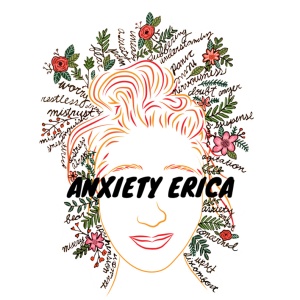“You just have to stay positive.”
“You don’t look depressed.”
“You have anxiety? You’re so social I would never have known.”
We’ve all heard them. Sayings that may seem simple, but continue to perpetuate the stigma surrounding mental health. It’s little phrases like “stay positive,” or “just snap out of it” that not only make those suffering from mental illness feel they are a burden, they aren’t even helpful or empathetic.
It’s been awhile, but I was so grateful to have these two wonderful artists share the phrases or sayings they’ve come into contact with throughout their journey.
What’s your stigma saying?
Sydnei
An aspiring art therapist, this sweet soul is advocating mental health and recovery through her beautiful doodles. With bright colors shining off of each print she draws, her words and art are a mixture of her own lessons in therapy and empowering affirmations for those who face their fears on a daily basis. You can buy her art here!

****TW: Abuse****
“That’s the phrase I heard over and over from my abuser. And I remember the first person I told said ‘that’s disgusting.’ Now, I am surrounded by people who care about me thankfully. But the word dirty has broke me, though these days I am much stronger. Even if I my room gets to a certain point of messy it’s like I shut down. Sometimes my hands with have paint and stuff and I shut down because it translates to ‘I’m dirty.’ It’s the biggest trigger for my PTSD. I’ve had to unlearn that phrase. I’d look in the mirror and instantly feel shame and disgust.”
Eliza
Promoting mental health one illustration at a time, this anxious doodler is here to break the stigma. I’ve only recently come to know Eliza, but judging from the vulnerable, authentic and powerful print she submitted for this series–we’ll be fast friends.

“Have you tried meditation? Omm yes… but that’s not the point.
Imagine having killer migraines that everyone you met had recommendations on how to take care of. But, you were allergic to the helpful essential oils and your tolerance levels were too high for pain killers. It would be frustrating to constantly hear solutions that worked for others but–because of your body’s chemistry–failed you.
It’s the same with my anxiety. When I open up about it, I’m not looking for solutions.
I’m looking for friendship and support. You don’t know the journey I’ve made or what solutions I’ve tried. You don’t know what may trigger bad memories or add to my anxiety. Perhaps try asking questions rather posing unsolicited advice. ‘Thank you for sharing. Is there something I can do to help?’ ‘I’ve never heard of that, can you tell me more?’
Solutions is what I pay my psychiatrist for. I need a network of caring friends not a network of well-meaning unlicensed doctors.”
With help from their pencil and paintbrush, these two artists communicate essential messages of unlearning phrases we’ve heard over and over and navigating unsolicited advice about our own individual struggle. I cannot stress how crucial breaking these stigmas are for those of us who consistently battle mental illness. I’m glad these two women are here, on the front lines with me. Showing up everyday and confronting society–while they confront each aspect of themselves.
Are you an artist that supports mental health? Share your story and you might be featured on the next Anxiety Art series!



